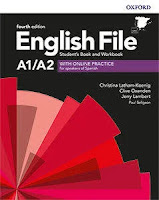You are going to describe famous people and you classmates have to guess who they are. You only have to write a short paragraph about a celebrity and other people may send comments saying who they think each person is.
08 November 2018
Who are they?
You are going to describe famous people and you classmates have to guess who they are. You only have to write a short paragraph about a celebrity and other people may send comments saying who they think each person is.
04 November 2018
Phonetic Symbols.
If you have always thought that understanding phonetic symbols is just too difficult for you, don't despair. It just takes some practice to get used to them but they can be very useful to help you improve your pronunciation.
Vowels :
Vowels :
20 May 2018
Clauses of contrast, purpose and reason
Grammar points » B1
Clauses of contrast
although, even though
We can use although/even though at the beginning or in the middle of a sentence followed by a clause (subject + verb). We NEVER use a comma after although or event though.- Although/Even though we had a bad game, we won.
- We won, although/even though we had a bad game.
however
We use however to connect two different sentences. We normally use however after a full stop (.) or a semi-colon (;). However should ALWAYS be followed by a comma.- We didn’t like the hotel. However, we had a fantastic time.
- We went to the beach; however, the weather wasn’t perfect.
despite / in spite of
Despite and in spite of are normally followed by a noun or a –ing verb. They can go at the beginning or in the middle of the sentence.- Despite/In spite of the rain, we went to the concert.
- They arrived despite/in spite of leaving very early.
- We went out despite/In spite of the fact that it was raining.
Clauses of purpose
to + infinitive
The most common way to express purpose in English is to + infinitive.- The student worked hard to pass the test.
in order to/so as to + infinitive
In order to or so as to + infinitive are more common in formal English, mainly in writing. The negative forms are in order not to and so as not to + infinitive.- We were asked to stay in order to finish the project.
- He left home early in order not to be late.
- Use a plastic hammer so as to avoid damage.
- They walked quietly so as not to wake up the children.
so that + clause
We can also use so that + subject + verb to express purpose. We normally use a modal verb with this connector. (could, can, would, etc.)- We left early so that we could park near the centre.
- He made some flashcards so that it would be easier for his mum to remember the instructions.
for + noun
We can also use for + noun to express purpose.- We went to the bar for a drink.
- Would you like to go the the park for a run?
Clauses of reason
When we want to explain the reason why something happened or why someone did something, we use a clause of reason introduced by a conjunction (as, since, because) or a noun phrase introduced by because of, due to, owing to, or on account of.
because
We use because before a clause (subject + verb). It can be used at the beginning or at the end of a sentence (at the end is more common). A comma is used when the clause of reason is at the beginning of the sentence.- We didn’t go because it was raining heavily.
- Because the event was cancelled, they lost their deposits.
as/since
We use as and since in a very similar way to because. They are followed by subject + verb and can be used at the beginning or at the end of a sentence. However, as and since are more formal expressions, and more common in written than in spoken English.- The government urged people to stay indoors since/as more rain is forecast for the entire weekend.
- As/Since the roads were blocked, the victims had to be rescued by helicopter.
because of
We use because of before a noun.- The concert was postponed because of the heavy rain.
due to
Due to means ‘because of’ although it is more formal. We also use due to before a noun.- The event was cancelled due to lack of interest.
- I couldn’t enjoy the meal due to their constant arguing.
Click here to do some exercises and see the whole explanation with charts.
16 May 2018
Homework for 2nd Year Intermediate Level students
- Grammar
- Exercises (1,2)
- More exercises
Time Clauses
Reported Speech
Relative Clauses
Modal Verbs
Verb Forms
Listening Comprehension
- Listening Activities
- General Listening Quizzes
- The Weather ( activities taken from Cristina's blog: Weather Forecast and song)
- Giving your opinion: For and Against
- Giving Opinion Essays; Exercises
- Formal Letters
- Business Letters and Emails
- Letter examples (1,2,3)
14 May 2018
09 May 2018
Gerund or infinitive?
The activity was created by Alejandro Carral. Thanks, Alex. It's really useful for intermediate level students.
Click here to do the activity.
Click here to do the activity.
Labels:
Intermediate,
Intermediate-Use of English
07 May 2018
26 April 2018
25 March 2018
16 March 2018
Speaking-Picture Description. Transport.
Click here to find an oral ativity to talk about transport. Describe the pictures and talk about the topic suggested. Use the list of vocabulary and structures included.
It's an oral ativity created by Antonia Ibáñez, EOI Avilés.
Thanks Mª Antonia!
It's an oral ativity created by Antonia Ibáñez, EOI Avilés.
Thanks Mª Antonia!
11 March 2018
EOI Intermediate Level. Picture Description.
In this video you can listen to a student describing a set of pictures. It is an example of how you can do this task in the Certification exam.
Click here to find really useful help for your speaking test on Cristina Cabal's blog. Thanks, Cristina, for your great work!
04 March 2018
Telling Stories
We thought it'd never come but it's winter again.
Days are shorter, darker and colder; however we can't deny each season has its charm and we have to try and make the most of these long dark nights.A winter pleasure I absolutely love is reading a good story on a cold stormy night, specially those with a touch of mystery; what's more, if they are somewhat gothic and scary, much better.
I know that many of you like Stephanie Meyer's saga, so why don't you have a go at the real thing, with vampires who are not so squeamish and know the appeal of red blood?
You may like Edward and all those gentle 'Twilight' vampires, but there is somet hing about Count Dracula, with his sinister elegance, that you should not miss; something worth experiencing form the safety of your sofa, so far away from Transilvania. After all, he has first attracted and then scared the hell out of hundreds of people throughout the years; there really must be something worth discovering about him.
hing about Count Dracula, with his sinister elegance, that you should not miss; something worth experiencing form the safety of your sofa, so far away from Transilvania. After all, he has first attracted and then scared the hell out of hundreds of people throughout the years; there really must be something worth discovering about him.
To start with, you can click here and read an extract from Bram Stoker's 'Dracula', but you'll have to do some work choosing the right tenses for the narration.
After doing the exercise, you may feel more curious about the count's story.
A completely different option for a stormy night reading could be 'Tales of th e Unexpected', a collection of short stories by Roald Dahl.
e Unexpected', a collection of short stories by Roald Dahl.
This is a terrific book, with some of the author's best stories, all of which are suprising, clever, twisted and, of course, completely unexpected. Dahl has an incredible ablility to make the macabre laughable and the stories never fail to shock and amuse the reader.
If you click here, you'll find an extract from 'Lamb to the Slaughter', one of the stories from the collection, and you can practise the use of narrative tenses with it.
You may like Edward and all those gentle 'Twilight' vampires, but there is somet
 hing about Count Dracula, with his sinister elegance, that you should not miss; something worth experiencing form the safety of your sofa, so far away from Transilvania. After all, he has first attracted and then scared the hell out of hundreds of people throughout the years; there really must be something worth discovering about him.
hing about Count Dracula, with his sinister elegance, that you should not miss; something worth experiencing form the safety of your sofa, so far away from Transilvania. After all, he has first attracted and then scared the hell out of hundreds of people throughout the years; there really must be something worth discovering about him.To start with, you can click here and read an extract from Bram Stoker's 'Dracula', but you'll have to do some work choosing the right tenses for the narration.
After doing the exercise, you may feel more curious about the count's story.
A completely different option for a stormy night reading could be 'Tales of th
 e Unexpected', a collection of short stories by Roald Dahl.
e Unexpected', a collection of short stories by Roald Dahl.This is a terrific book, with some of the author's best stories, all of which are suprising, clever, twisted and, of course, completely unexpected. Dahl has an incredible ablility to make the macabre laughable and the stories never fail to shock and amuse the reader.
If you click here, you'll find an extract from 'Lamb to the Slaughter', one of the stories from the collection, and you can practise the use of narrative tenses with it.
 Well, last but not least, I have another suggestion for you: 'Misery' , by Stephen king, a master at scaring readers. I must admit I haven't read this book myself. I've seen the film ,though, so I think it's high time I read something by S.K. just to know first hand if he is as good as they say.
Well, last but not least, I have another suggestion for you: 'Misery' , by Stephen king, a master at scaring readers. I must admit I haven't read this book myself. I've seen the film ,though, so I think it's high time I read something by S.K. just to know first hand if he is as good as they say.
Click here to do some practice with your narrative skills. This time the excerpt is from 'Misery'.
Well, now it's your turn, I'd be deligted to know about your favourite mystery stories or tales. I'd be great if we could share our experiences as adventurous readers, curled up under a blanket with a good book in our hands on a spooky night, fighting demons, vampires or any other monsters which dare try to scare us. They may succeed at first but eventually we'll win and enjoy the ride, that's for sure.
You can send your recommendations if you click here :
You can also add them to the reading section in the forum
By the way, why don't you do a crossword on monsters in literature and culture? It'll be fun!

02 March 2018
Narrative Tenses
01 March 2018
21 January 2018
Writing Emails in English
Electronic mail, most commonly abbreviated email or e-mail, is a method of exchanging digital messages.
An electronic mail message consists of two components, the message header, and the message body, which is the email's content. The message header contains control information, including, minimally, an originator's email adrress and one or more recipient addresses. Usually additional information is added, such as a subject header field.
Emails are a fast way to communicate for business and pleasure. In this post you'll find useful hints and tips to write better emails in English.
An electronic mail message consists of two components, the message header, and the message body, which is the email's content. The message header contains control information, including, minimally, an originator's email adrress and one or more recipient addresses. Usually additional information is added, such as a subject header field.
Emails are a fast way to communicate for business and pleasure. In this post you'll find useful hints and tips to write better emails in English.
Parts of Email
Here are the fields of the Email defined with example texts
Example Subjects
The Subject is more important than the email itself, it should be focused, clear and informative.
Strong Subjects:
- Invitation to the ABC Conference, Nov 2009
- Application for Account Manager Position #413 – Jane Smith CV
- Agenda for the meeting on Monday, 10am
- Party Invitation for John, Sally and Martin
- Updates on the building plans
- Meeting scheduled for Oct 15, Thursday @ 10am
- Great craft ideas using recyclable materials
Weak Subjects:
- [blank]
- Hi, Hello, How are you?
- First line of the email message
- Words to avoid: Help, Percent Off, Reminder, Free
Example Greetings:
- Dear [name],
- Hi [name],
- Hi,
- Hello [name],
- Hello,
- To whom it may concern,
Example Opening Sentences
- Following our phone conversation, I am sending you…
- Attached please find the documents you requested regarding…
- In regards to the upcoming pilot program, I have listed below the tasks and deadlines that need to be completed.
- Further to our last discussion, I would like to bring to your attention the following issues:
- As we agreed, there will not be …
- Please reconsider our proposal for …
- In response to your job post for Marketing Director, please find below a brief overview of my skills. I have also attached my CV for your review.
Example Email Information in Detail: details, information and actions required.
- Here is the detailed list:
- In addition to the attached agenda, please click on this link http://www...
- To register for the online event, please go to...
Example Closing Sentences
- I look forward to your reply.
- Thank you for the time you have taken to review my candidacy for the position.
- Please don’t hesitate to contact me with any questions or concerns you may have.
- Thank you, in advance, for your time.
- I await receipt of the information we discussed.
- Please forward me the exact information.
Example Sign-offs before the Signature: identify yourself, company and contact information.
- Sincerely,
- Thank you,
- Best Regards,
- Thanks,
Signature
Name
Title, company name
Email
Phone/Fax
Web Address
Click here for more example emails.
- Job Interview Thank you
- Job Cover Letter
- Request For Update on a Pilot
Email Features
Parts of Email
Here are the fields of the Email defined with example texts
Here are the fields of the Email defined with example texts
Example Subjects
Strong Subjects:
| Weak Subjects:
|
Name
Title, company name
Email
Phone/Fax
Web Address
Title, company name
Phone/Fax
Web Address
There are many features that are included in emails; here I will highlight just a few important ones.
Spelling: Always proofread before sending: spelling, punctuation and grammar. [F7]
Insert: Since emails are filtered here are a few tips regarding attachments and links:
- Keep file sizes small.
- ZIP or PDF attachments (exe, jpg, xls, doc are sometimes considered spam).
- When replying, do not resend attachments again.
- Use links whenever possible to files that are stored online or in shared folders.
Options: If the email is very important, under options request a read receipt, this way you can ensure the email has arrived at its destination.
Reply to All: Stop and think before hitting reply to all sometimes you may just need to hit reply.
The information in this post has been taken from Wikipedia and Learn English on line
There are many features that are included in emails; here I will highlight just a few important ones.
Spelling: Always proofread before sending: spelling, punctuation and grammar. [F7]
The information in this post has been taken from Wikipedia and Learn English on line
17 January 2018
Basic formal letters
Click on the link below to learn how to write formal letters in English
Click here to see an example of different types of letters with useful expressions (Hacer clic en los enlaces abajo para ver ejemplos de distintas cartas formales con vocubulario y frases útiles)
- Carta formal en inglés para solicitar información:Letter of enquiry - Explain clearly what information you require and why.
- Carta formal en inglés para formular una queja formal:Letter of complaint - Explain the reason for your complaint in the first paragraph and then give details in further paragraphs.
- Carta formal en inglés para solictar un puesto de trabajo:Letter of application - Explain which post you want to apply for, where you saw it advertised and include any relevant information about yourself.
- Carta formal en inglés para disculparse:
Letter of apology - Express regret and explain why you are apologising.
Letter Writing Exercises
Letter writing is one of the tasks you may be asked to do for your Certification Terminal Test in June. So, the more you practise, the better.
To start with,you can have a look at several model letters and then do these exercises.
To start with,you can have a look at several model letters and then do these exercises.
Labels:
Intermediate,
Intermediate-Writing,
Writing
















